
JOURNAL OF THE AMERICAN MOSQUITO CONTROL ASSOCIATION
Scope & Guideline
Advancing mosquito management for a healthier tomorrow.
Introduction
Aims and Scopes
- Vector Biology and Ecology:
Research on the biology, ecology, and behavior of mosquito species, including their interactions with the environment and other species. This includes studies on habitat preferences, breeding sites, and seasonal population dynamics. - Surveillance and Monitoring:
Development and evaluation of methodologies for monitoring mosquito populations and their associated pathogens. This includes the use of traps, surveillance technologies, and epidemiological assessments to track mosquito-borne disease outbreaks. - Insecticide Resistance Management:
Investigations into the mechanisms and prevalence of insecticide resistance in mosquito populations. This research aims to inform management practices and the development of new control strategies to mitigate resistance. - Control Strategies and Efficacy Studies:
Evaluation of various mosquito control methods, including chemical, biological, and environmental interventions. Research focuses on the efficacy and nontarget effects of these control strategies. - Public Health Implications:
Research that connects mosquito control efforts with public health outcomes, particularly in relation to vector-borne disease transmission and community health education.
Trending and Emerging
- Innovative Surveillance Techniques:
Emerging themes in the use of technology for mosquito surveillance, such as the application of drones and advanced trapping methods, are gaining traction. This reflects the need for more efficient and effective monitoring systems in vector control. - Genomic and Molecular Studies:
Increasing research on the genetic and molecular aspects of mosquitoes, including studies on resistance genes and pathogen interactions. This trend is critical for developing targeted control strategies and understanding disease dynamics. - Climate Change Impact Studies:
Research focusing on the effects of climate change on mosquito populations and the transmission of mosquito-borne diseases is becoming more prevalent. This theme highlights the importance of understanding environmental changes in vector ecology. - Community Engagement and Education:
A growing emphasis on community participation in mosquito control efforts and public education about vector-borne diseases. This approach recognizes the role of public awareness in effective control strategies.
Declining or Waning
- Historical Data Analysis:
There has been a noticeable decrease in studies focused solely on historical data analysis of mosquito populations and diseases, likely due to a shift towards more immediate, applied research that addresses current challenges in mosquito control. - Laboratory-Based Studies:
Fewer publications seem to focus on purely laboratory-based studies without field applications. The trend is shifting towards integrated studies that incorporate both lab and field data to provide more comprehensive insights. - Invasive Species Studies:
Research specifically targeting invasive mosquito species appears to be less frequent, possibly indicating that such studies have become more integrated into broader ecological and epidemiological research.
Similar Journals
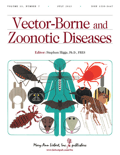
VECTOR-BORNE AND ZOONOTIC DISEASES
Empowering researchers to tackle emerging health challenges.VECTOR-BORNE AND ZOONOTIC DISEASES is a prominent journal dedicated to advancing research in the fields of infectious diseases, microbiology, and virology, published by Mary Ann Liebert, Inc. With a rich history spanning from 2001 to 2024, this journal plays a critical role in disseminating cutting-edge research and insights regarding diseases transmitted by vectors and zoonotic pathogens. It has achieved notable rankings, including Q2 in the Infectious Diseases category and Q3 in both Microbiology and Virology as of 2023. The journal's emphasis on quality and relevance is further underscored by its established position—ranked 151st in Infectious Diseases and within the 43rd percentile in Virology according to Scopus. Although not an open-access journal, the publication ensures that its findings reach a broad audience of researchers, professionals, and students dedicated to tackling the challenges posed by these critical health issues. By providing a platform for innovative studies and discussions, VECTOR-BORNE AND ZOONOTIC DISEASES remains an essential resource for those at the forefront of disease research and public health strategies.

MEDICAL AND VETERINARY ENTOMOLOGY
Unraveling Insect Mysteries for Better Health OutcomesMEDICAL AND VETERINARY ENTOMOLOGY is a leading journal published by Wiley that focuses on the intricate relationships between insects and their roles in both medical and veterinary contexts. With an ISSN of 0269-283X and an E-ISSN of 1365-2915, this journal has established itself as an essential resource for researchers, professionals, and students alike, showcasing critical studies that advance our understanding of entomology's impact on public health and animal welfare. The journal spans from 1987 to 2024, indicating its long-standing contribution to the field, and it continues to maintain a strong reputation with an impressive categorization in the Q1 and Q2 quartiles across notable disciplines such as Insect Science and Veterinary Studies. While it is not an Open Access journal, its rigorous editorial standards and high impact factor make it a vital platform that attracts quality research in the ecology, evolution, and control of medically and veterinary important insects. As the field evolves, MEDICAL AND VETERINARY ENTOMOLOGY remains a pivotal asset for scholars striving to tackle current challenges and improve strategies in entomological research.
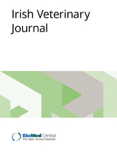
IRISH VETERINARY JOURNAL
Shaping the future of veterinary science, one study at a time.IRISH VETERINARY JOURNAL is a premier open-access publication in the field of veterinary science, established to disseminate high-quality research and innovations that advance the veterinary profession and animal health. Published by BMC since 2004, this journal not only ensures worldwide access to cutting-edge findings but also maintains an impressive ranking as Q1 in the Veterinary (miscellaneous) category according to the 2023 metrics, highlighting its significance and influence. With an impressive Scopus rank of #19/194 and a 90th percentile placement, it provides a robust platform for researchers, professionals, and students alike to engage with the latest studies, reviews, and case reports. The journal's coverage spans from its inception in 1973 to the present, catering to a diverse audience interested in various aspects of veterinary science, ensuring that it remains an essential resource for those passionate about the welfare of animals and the advancement of veterinary practices.
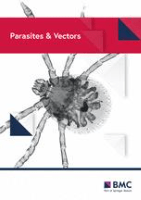
Parasites & Vectors
Connecting researchers to tackle global health challenges.Parasites & Vectors is a leading open access journal dedicated to the dissemination of high-quality research on the vectors of infectious diseases and their parasitic agents. Published by BMC in the United Kingdom, this journal has been at the forefront of its field since its establishment in 2008, contributing to our understanding of vector-borne pathogens through its rigorous peer-reviewed articles. With a notable impact factor and categorized in the top quartile (Q1) in both Infectious Diseases and Parasitology, it is an essential resource for researchers, professionals, and students worldwide. The journal ranks impressively within various categories, holding a position of 7th out of 194 in Veterinary General Veterinary and 12th out of 79 in Immunology and Microbiology Parasitology, indicating its significant contribution to the sciences. Accessible to all, Parasites & Vectors supports the global pursuit of knowledge in epidemiology and disease control, making it an indispensable platform for sharing innovative findings and fostering collaboration within the scientific community.

JOURNAL OF PEST SCIENCE
Advancing pest management through innovative research.JOURNAL OF PEST SCIENCE, published by SPRINGER HEIDELBERG, is a premier academic journal dedicated to the multidisciplinary study of pest management, contributing significantly to the fields of Agronomy, Ecology, and Insect Science. With a history that spans back to 1925, this journal has established itself as a critical platform for disseminating innovative research, evidenced by its impressive Q1 rankings in multiple categories, including Ecology and Plant Science, as of 2023. The journal particularly excels in its contribution to Agricultural and Biological Sciences, holding a remarkable 98th percentile rank in Insect Science. By fostering open access, the JOURNAL OF PEST SCIENCE ensures broader dissemination and engagement with scientific advancements pertinent to pest control and management practices. Its commitment to publishing high-quality, peer-reviewed articles makes it an essential resource for researchers, professionals, and students looking to stay at the forefront of pest science and its application to sustainable agriculture and ecology.

Russian Journal of Biological Invasions
Illuminating the path to effective management strategies.Russian Journal of Biological Invasions, published by PLEIADES PUBLISHING INC, is a pioneering periodical dedicated to advancing the understanding of biological invasions in diverse ecological contexts. With an ISSN of 2075-1117 and an E-ISSN of 2075-1125, the journal primarily serves the scientific community in the fields of ecology, evolution, behavior, and systematics, boasting a respectable Q3 categorization in Ecology for 2023 and ranking 559 out of 721 in its domain in Scopus. The journal's coverage spans from 2010 to 2024, addressing critical issues such as the ecological impacts of invasive species and offering insights into management strategies. Though not an Open Access journal, it provides invaluable resources for researchers, professionals, and students keen on tackling the challenges posed by biological invasions. Its contributions significantly enrich the discourse in ecological research and conservation efforts, making it an essential resource for those seeking to comprehend and mitigate the effects of invasive species on ecosystems across the globe.

JOURNAL OF INSECT SCIENCE
Unveiling the Secrets of Insect EcologyJOURNAL OF INSECT SCIENCE, published by OXFORD UNIV PRESS INC, stands as a pivotal platform in the field of insect science, offering open-access research since 2001. With an impactful presence in the academic community, this journal spans the convergence of entomology and various interdisciplinary studies, establishing itself in the Q2 quartile for both Insect Science and Medicine (miscellaneous) categories as of 2023. This esteemed journal is recognized for its contributions to the understanding and management of insect biology, ecology, and their implications for agriculture and human health, garnering a Scopus rank of 44 out of 181 in Agricultural and Biological Sciences. The Open Access model encourages wide dissemination of knowledge, making the rich repository of research accessible to a global audience. With ongoing publications until 2024, JOURNAL OF INSECT SCIENCE serves as an essential resource for researchers, professionals, and students seeking to deepen their understanding of the crucial role insects play in our ecosystem.
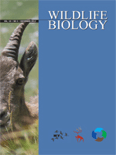
WILDLIFE BIOLOGY
Empowering research to protect our planet's wildlife.WILDLIFE BIOLOGY is a prestigious open-access journal published by WILEY, dedicated to the dissemination of high-quality research in the fields of ecology, evolution, behavior, and conservation. With an impressive Impact Factor indicative of its scholarly relevance, the journal has been a cornerstone for researchers since its inception in 1995, now extending its convergence through 2024. Recognized within the top Q1 and Q2 quartiles across various categories—including Ecology, Evolution, Behavior and Systematics and Management, Monitoring, Policy and Law—this journal plays a crucial role in fostering knowledge and promoting effective solutions in wildlife biology. The journal serves a diverse audience, offering robust access options since 2014, ensuring that vital research is freely available to professionals, researchers, and students alike. With its base in Denmark, the journal encourages contributions that address pressing wildlife management issues and informs policy development, further cementing its significance in the ecological research community.

JOURNAL OF VECTOR BORNE DISEASES
Fostering collaboration to tackle vector-borne health threats.JOURNAL OF VECTOR BORNE DISEASES, published by Wolters Kluwer Medknow Publications, is an esteemed peer-reviewed journal dedicated to advancing the understanding of vector-borne diseases, a significant concern in global health. Established in 2003, this open-access journal has fostered a rich repository of research, spanning clinical studies, epidemiology, and control strategies related to diseases transmitted by vectors like mosquitoes and ticks. With its impact continuing to grow, as evident from its Q3 quartile rankings in Infectious Diseases and Medicine (miscellaneous) categories in 2023, the journal provides a critical platform for researchers and healthcare professionals to disseminate findings that inform policy and practice. With the aim of highlighting contemporary issues and innovations in the field, it is vital for ongoing discussions and advancements in vector-borne disease management. Evaluation metrics from Scopus, although currently positioned in the lower percentiles, underscore the journal's importance as an emerging source of scholarly information in parasitology and immunology. By adhering to its open-access model since 2012, the journal ensures that its valuable content is readily accessible, facilitating widespread knowledge transfer and collaboration among scholars and practitioners alike.
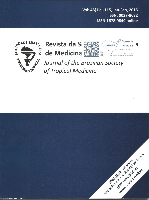
Revista da Sociedade Brasileira de Medicina Tropical
Illuminating the complexities of microbiology and parasitology.Revista da Sociedade Brasileira de Medicina Tropical is a distinguished open-access journal published by the Sociedade Brasileira de Medicina Tropical, focusing on the critical fields of Infectious Diseases, Microbiology, and Parasitology. Since its inception in 1972, this journal has committed to disseminating impactful research that addresses pressing global health challenges, particularly in tropical and infectious diseases prevalent in Brazil and beyond. With a robust publication history, it has been recognized as a Q3 journal in esteemed categories, reflecting its valuable contributions to scientific literature and its ranking in various Scopus categories, including a notable position in Parasitology. Researchers, professionals, and students are encouraged to engage with its rich repository of research, which has been freely accessible since 1997, fostering a wide-reaching impact on public health strategy and scientific innovation.